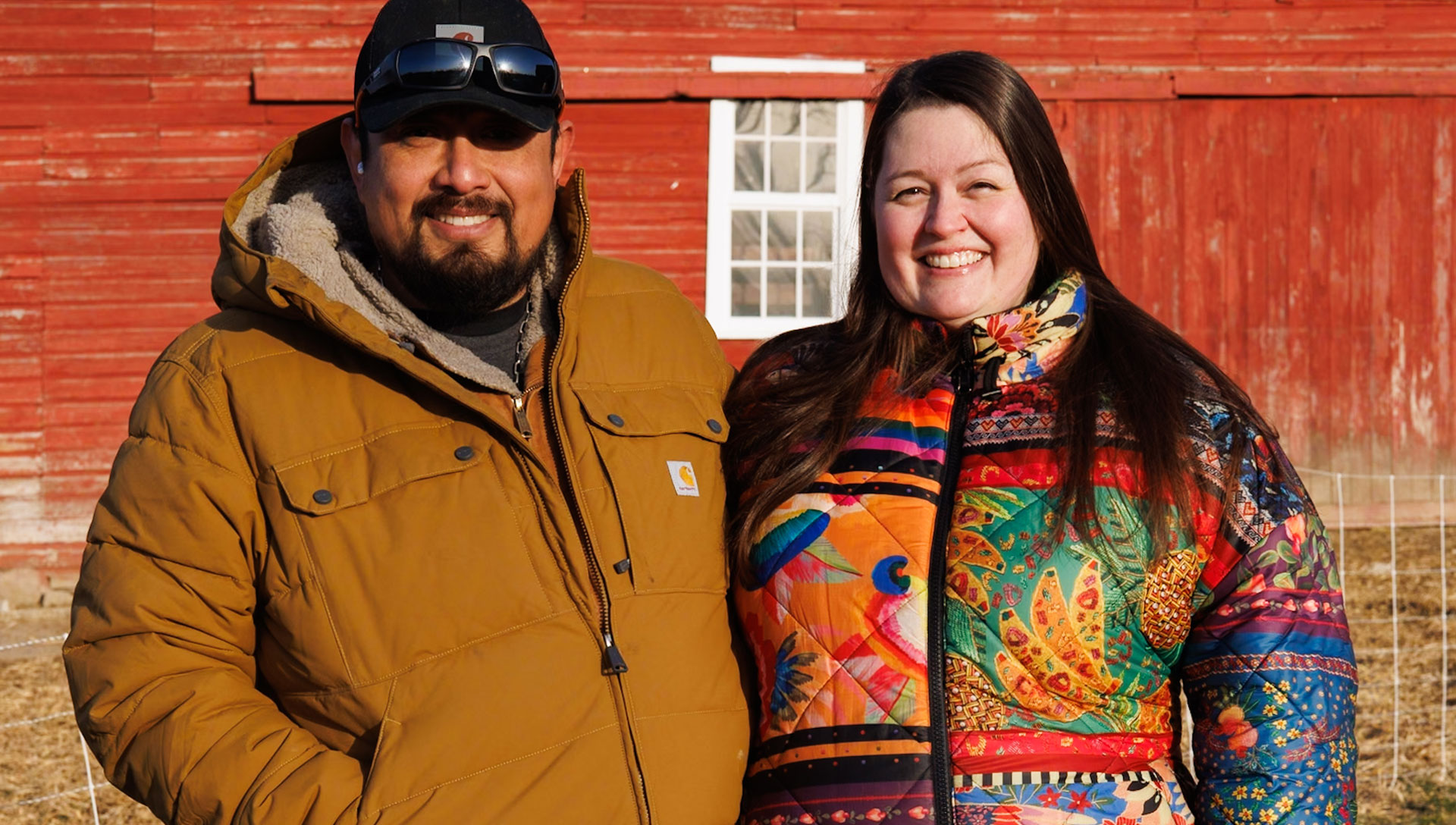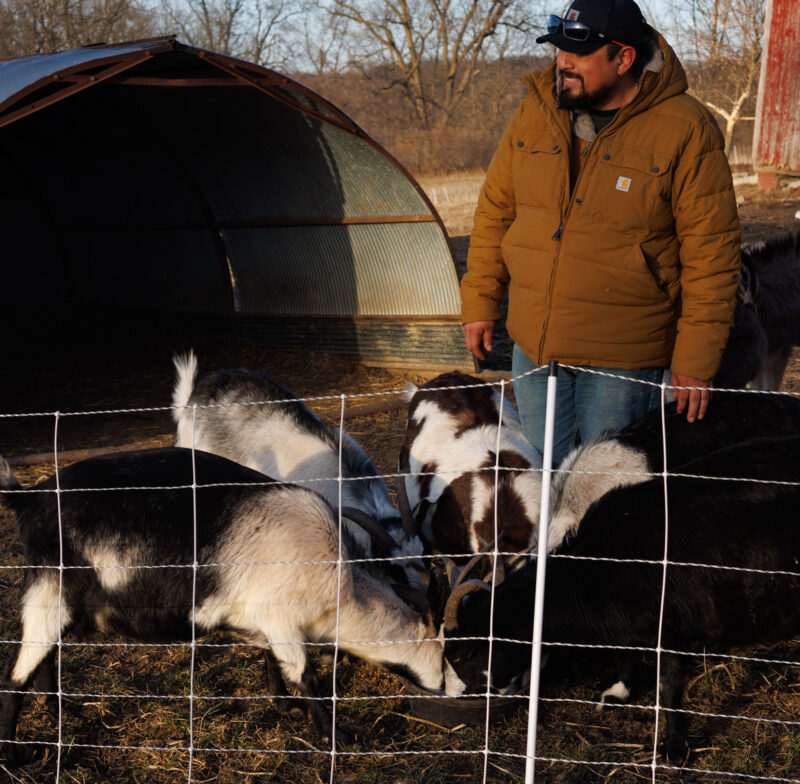How one couple’s dream for an independent meat processing facility is strengthening the regional food system
 Damian Rivera and Rosemary Linares, co-owners of Damian’s Craft Meats. Photo by Jessica Lofton-Williams.
Damian Rivera and Rosemary Linares, co-owners of Damian’s Craft Meats. Photo by Jessica Lofton-Williams.
When Rosemary Linares says, “slaughtering is in my blood,” it’s not just a nifty turn of phrase. Linares’ great grandparents started a thriving slaughtering business in Michigan a century ago. Her husband and co-founder of Damian’s Craft Meats, Damian Rivera, honed his craft starting at the age of 10 as a carnicero in his native Mexico. Both come from traditions in which animal husbandry and meat processing are second nature. The meat industry in 2025, however, bears little resemblance to the traditions in which they were raised.
“Our food system is incredibly fragile,” says Linares. She explains that over the past few decades, the meat industry has consolidated to the point where most packaged meat found at the grocery store comes from eight major meat processors who butcher and ship their product a considerable distance before it is available to consumers at the supermarket. While processing meat at only a few facilities has the benefit of increased efficiency, one of the tradeoffs has been a steep decline in animal and worker welfare in the industry.
“We’ve learned so much,” says Linares of her and Rivera’s decade-long journey to launch a slaughter and processing facility that provides high-quality, local, and humanely raised meat to their Midwest region. “It’s been a big learning curve, and it’s been important to not only be mindful of the fragility of our food system, but of the potential power of our food and our food system,” says Linares.
“It’s been important to not only be mindful of the fragility of our food system, but of the potential power of our food and our food system.”
 Damian Rivera. Photo by Jessica Lofton- Williams.
Damian Rivera. Photo by Jessica Lofton- Williams.
It’s that power of the food system that Linares and Rivera have harnessed to remain resilient in the face of setbacks, withstand challenges, and emerge stronger — not merely surviving, but thriving, no matter the obstacles that present themselves, be they economic uncertainty or ongoing social injustice or the next climate disaster. The couple’s own resilience is a testament both to their personal commitment to advancing equity and sustainability in the meat processing industry, and to the power of food to transform communities.
Linares was first introduced to Michigan Good Food Fund in 2018 through a connection to Fair Food Network. That year, Michigan Good Food Fund awarded Damian’s Craft Meats a catalytic investment award designed to attract additional funders for the business’ plan to shift from on-farm animal processing services to a centralized processing facility that they will own and operate. Combining the award with grant funding from the USDA, Linares and Rivera invested in a comprehensive feasibility study and preliminary site design. In 2024, Fair Food Network received a grant from the Chicago Regional Food Systems Fund that was awarded to Damain’s Craft Meats to catalyze the critical site planning phase of the project. Later that year, the business received a nearly $4.2 million grant from USDA as part of a $35 million investment into 15 independent meat processors in 12 states.
When construction is finally completed on their $13.9 million, 23,250-square foot centralized processing facility, Linares and Rivera will be the proud owners and operators of the only USDA-inspected meat processing plant in a 70-mile radius. “Damian’s Craft Meats, besides being aligned with our mission to support thriving economies and community resilience, is responding to a genuine need that farmers in the region have expressed,” says Joel Moyer, Director of Investments for Fair Food Fund, which re-granted funding from the Chicago Regional Food Systems Fund to catalyze the critical site planning phase of the project.
In addition to the benefit to farmers in the region — who no longer need to bear the cost in both time and money of traveling exorbitant distances to process livestock — the new processing plant will “infuse equity from the very beginning as a driving value,” meaning that the benefits will be shared with the workers and four-legged animals on which the industry depends.
“When we look at the workforce, they’re predominantly immigrants,” says Linares, herself a descendent of Cuban immigrants. “Damian and I are both bilingual, so training [at the new facility] will be in English and Spanish and we can offer a culturally responsive atmosphere for the workers.” Linares and Rivera are thinking about different innovative models like employee ownership and profit sharing, as well. “It’s very dangerous work and we respect the workers,” she adds.
Linares also stresses how the 10-year journey of starting a slaughtering business from the ground up has personally brought her closer to the food she eats. “I think it’s important to know the process [of raising meat],” she says. “We’ve learned so much, just about the entire process of what foods animals eat, what their experience is in both life and death, how they can live with dignity and how they can be treated with dignity, and how that impacts everything else — including flavor.”
As much as the meat industry has changed since Linares spent hot summer days cooling off in her great-grandparents’ slaughterhouse, she and Rivera are determined to lead the way in harnessing the power of food to build a more resilient local community.
Want to read more stories from the field?
Dig into our blog to read about positive community changemakers across the country.







